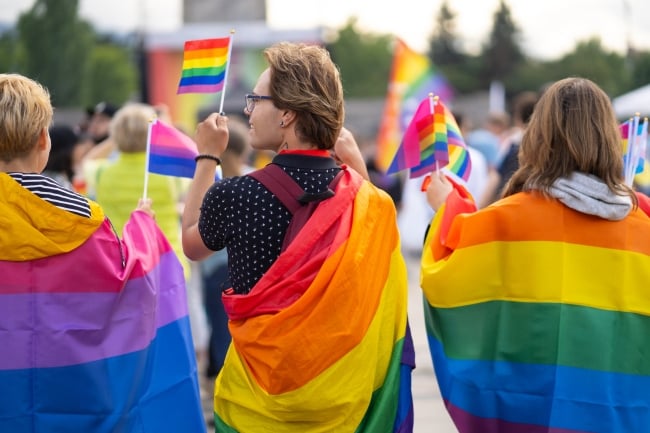You have /5 articles left.
Sign up for a free account or log in.

To help LGBTQ+ students feel they belong at their college or university, campus leaders should consider initiatives that promote their health, well-being and thriving.
Vladimir Vladimirov/E+/Getty Images
Many students on today’s campuses are openly LGBTQ+, with more than one in five Gen Z individuals identifying as lesbian, gay, bisexual, transgender, queer or some other sexual orientation besides heterosexual.
These students face unique challenges, particularly in building community and feeling included. A recent study by TimelyCare and Active Minds found LGBTQ+ students were more likely to say they feel lonely (70 percent), isolated from their peers (33 percent) or left out (26 percent). The Trevor Project, a nonprofit that represents LGBTQ+ young people from across the U.S., found 39 percent of LGBTQ+ youth have seriously considered attempting suicide in the past year.
Here are four ways campus leaders are promoting belonging, thriving and engagement among students in the LGBTQ+ community.
- Create a campus pride week
While pride is traditionally celebrated in June, after the conclusion of the academic year for some institutions, colleges and university leaders can participate in an earlier version to inspire and engage students while they’re still in class. Many choose to participate in Campus Pride Month in April.
At the University of Kentucky, the Office of LGBTQ* Resources hosted a pride week in April, which included educational workshops, guest speakers and social gatherings “designed to promote LGBTQ+ visibility and acceptance,” according to a university release.
The University of Missouri celebrates pride month in April, as well, hosting tie-dye events, free cupcake and coffee giveaways, pride movie night, a book club, and educational sessions covering intersectionality, LGBTQ+ relationships, how to be an ally and more.
George Mason University hosts its Mason Pride Week at the end of March and in early April, and the campus participates in local pride events during June. The week also recognizes professors in the LGBTQ+ Faculty Fellows Summit, launched this year.
- Establish an LGBTQ+ resource space
One of the challenges for LGBTQ+ students at college is not knowing where or whom they can turn to for support. A physical or online resource space can connect learners with supportive care and build feelings of connection to the institution.
Manhattan College opened its Pride Center in October 2023, creating a formal place for students to gather as well as launching campuswide programming, awareness, training and collaboration. The physical space is maintained by staff and student volunteers, and the center’s website provides additional on- and off-campus resources.
California State University, Fullerton, reopened its resource center this spring, named after an alumnus and his spouse, the Losquadro Keller LGBTQ Resource Center (LK QRC). At the center, students can receive help with advising and financial aid, engage with the Pride Alliance, or explore a queer studies minor.
- Build peer connections
Campus leaders can help combat loneliness among LGBTQ+ students by encouraging learners to engage with their peers.
Social clubs and groups promote organic engagement among learners and can be particularly impactful for college students in areas where there is less support for LGBTQ+ issues. In Texas, student groups have advocated for civil rights and provide important resources and connections for one another.
A gathering place on campus can also help LGBTQ+ campus constituents find community. At Stanford University, Queer Student Resources has an informal hangout space that is open to any student to relax, study, meet up with friends or enjoy some natural light and houseplants. The space has computers, a library and meeting space for activities and events.
Living-learning communities can also unify students who are LGBTQ+ or interested in LGBTQ+ issues. The University of Oregon’s LGBTQ+ Scholars program houses participants in the same residence hall, and students take two terms of a seminar course together.
Counseling groups for LGBTQ+ students can provide a confidential and safe space for students to explore their identities, lived experiences or other topics.
- Offer academic support
In addition to supporting students’ personal growth, institutions can invest in learners’ academic success through targeted interventions.
Rio Hondo College in California hosts the Queer Initiative Scholars, a program that supports students who identify as LGBTQ+ in their academics with financial aid, scholarships, housing and food insecurity resources, and a support group. The group is open to any LGBTQ+ student at Rio Hondo and there is no fee to join.
Faculty mentorship can also help students thrive as scholars and as members of the community. Roanoke College in Virginia connects students with faculty and staff members who are LGBTQ+ themselves or have personal connections to the community, giving students role models to engage with throughout their time at the institution.
Santa Monica College’s Student Equity Resource Center highlights recommended courses that focus on different social justice issues, including LGBTQ+-friendly classes. These classes provide a way for students to learn more about important issues and engage with faculty members who are knowledgeable and compassionate in these areas.
Get more content like this directly to your inbox every weekday morning. Subscribe here.




